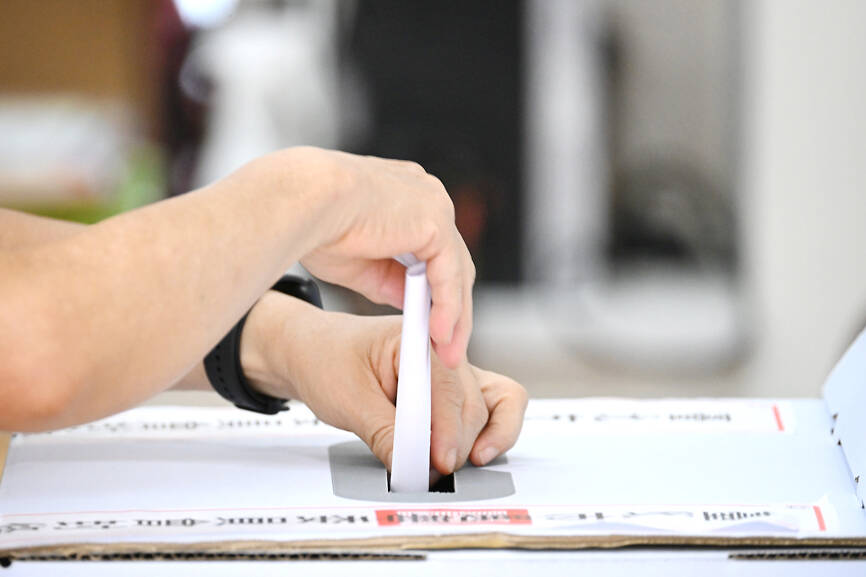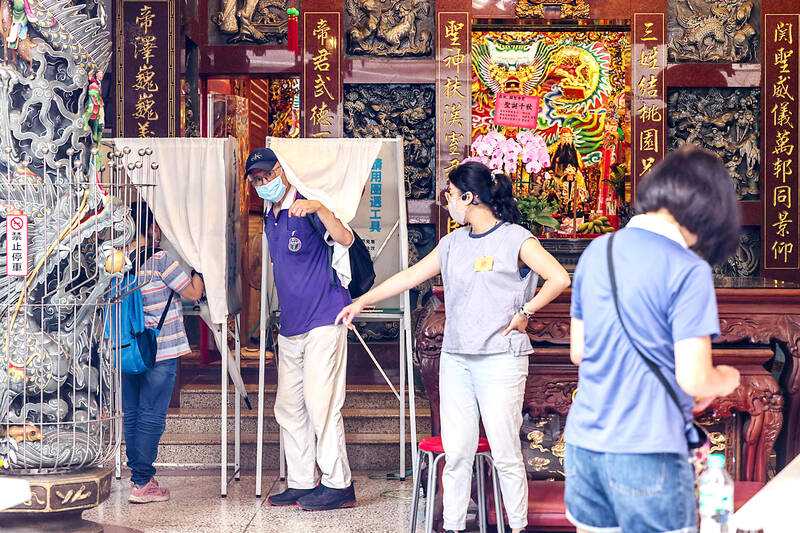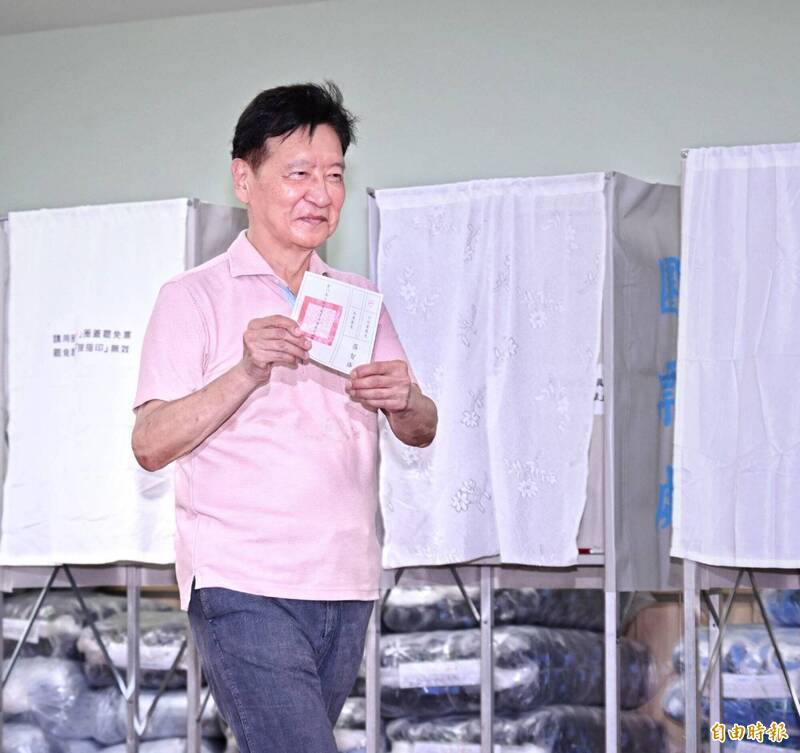Multiple reports of infractions and alleged rule-breaking were reported at voting stations across nine electoral districts during yesterday’s recall voting.
The Central Election Commission (CEC) Taipei office’s election oversight committee yesterday forwarded a complaint to the Taipei District Prosecutors’ Office regarding former Broadcasting Corp of China chairman Jaw Shaw-kong (趙少康) for allegedly contravening the Civil Servants Election and Recall Act (公職人員選舉罷免法).
The complaint was based on Jaw displaying his stamped ballot to the media at a recall polling station in Taipei’s Daan District (大安).

Photo: Chen Yi-kuan, Taipei Times
Jaw said he made a mistake and apologized for “setting a bad example.” Under articles 88 and 105 of the act, displaying a marked ballot can result in penalties of up to two years in prison or a fine of up to NT$200,000.
Other incidents also occurred, including one in Taoyuan, where a 58-year-old woman surnamed Huang (黃) tore up her ballot at a voting booth after mistakenly using her personal seal. Her request for a new ballot was refused.
In a separate incident in Taoyuan, a 70-year-old man surnamed Wu (吳) tore up his ballot after it was deemed invalid due to smudging caused by an ink-stained finger. The Taoyuan City Election Commission stated that such behavior is punishable by a fine ranging from NT$5,000 to NT$50,000.

Photo: Cheng I-hwa, AFP
In Taichung’s Nantun District (南屯), a 58-year-old voter surnamed Lai (賴) forgot to silence her phone, and it rang as she entered a polling station. As a result, she could face a fine of between NT$30,000 and NT$300,000, according to the CEC Taichung office’s election oversight committee.
Under Paragraph 3, Article 65 of the act, portable phones and other recording devices are prohibited in polling stations unless used for official business. Devices that are powered off may be permitted.
At polling station 156, also in Nantun District, it was discovered that surveillance cameras were in use. After being informed of the situation, the authorities at Wanhe Junior High School instructed school staff to cover the cameras’ lenses.

Photo: Fang Pin-chao, Taipei Times
In addition, a post on the Facebook page “Farm Girl’s View of the World” shared an incident in New Taipei City, where a voter found the surface of their voting booth covered in ink, which stained their ballot.
Initially, polling officials deemed the ballot invalid, but after the voter’s complaints, they were provided with a new ballot, and the booth surface was cleaned, the post said.
Thirty-three election-related contraventions had been reported at polling stations across the nation yesterday, the National Police Agency said.
Additional reporting by Chou Min-hung, Huang Hsu-lei,
Huang Cheng-chia, Cheng Ching-yi and CNA

The Coast Guard Administration (CGA) yesterday said it had deployed patrol vessels to expel a China Coast Guard ship and a Chinese fishing boat near Pratas Island (Dongsha Island, 東沙群島) in the South China Sea. The China Coast Guard vessel was 28 nautical miles (52km) northeast of Pratas at 6:15am on Thursday, approaching the island’s restricted waters, which extend 24 nautical miles from its shoreline, the CGA’s Dongsha-Nansha Branch said in a statement. The Tainan, a 2,000-tonne cutter, was deployed by the CGA to shadow the Chinese ship, which left the area at 2:39pm on Friday, the statement said. At 6:31pm on Friday,

The Chinese People’s Liberation Army Navy’s (PLAN) third aircraft carrier, the Fujian, would pose a steep challenge to Taiwan’s ability to defend itself against a full-scale invasion, a defense expert said yesterday. Institute of National Defense and Security Research analyst Chieh Chung (揭仲) made the comment hours after the PLAN confirmed the carrier recently passed through the Taiwan Strait to conduct “scientific research tests and training missions” in the South China Sea. China has two carriers in operation — the Liaoning and the Shandong — with the Fujian undergoing sea trials. Although the PLAN needs time to train the Fujian’s air wing and

The American Institute in Taiwan (AIT) put Taiwan in danger, Ma Ying-jeou Foundation director Hsiao Hsu-tsen (蕭旭岑) said yesterday, hours after the de facto US embassy said that Beijing had misinterpreted World War II-era documents to isolate Taiwan. The AIT’s comments harmed the Republic of China’s (ROC) national interests and contradicted a part of the “six assurances” stipulating that the US would not change its official position on Taiwan’s sovereignty, Hsiao said. The “six assurances,” which were given by then-US president Ronald Reagan to Taiwan in 1982, say that Washington would not set a date for ending arm sales to Taiwan, consult

A Taiwanese academic yesterday said that Chinese Ambassador to Denmark Wang Xuefeng (王雪峰) disrespected Denmark and Japan when he earlier this year allegedly asked Japan’s embassy to make Taiwan’s representatives leave an event in Copenhagen. The Danish-language Berlingske on Sunday reported the incident in an article with the headline “The emperor’s birthday ended in drama in Copenhagen: More conflict may be on the way between Denmark and China.” It said that on Feb. 26, the Japanese embassy in Denmark held an event for Japanese Emperor Naruhito’s birthday, with about 200 guests in attendance, including representatives from Taiwan. After addressing the Japanese hosts, Wang